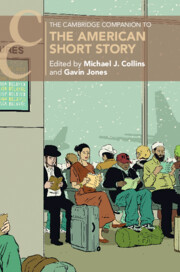Book contents
- The Cambridge Companion to the American Short Story
- The Cambridge Companion to the American Short Story
- Copyright page
- Contents
- Figures
- Tables
- Contributors
- Chronology
- Introduction
- Part I Contexts
- Part II Histories
- Part III People and Places
- Part IV Theories
- Chapter 17 Short Fiction, Language Learning, and Innocent Comedy
- Chapter 18 The Technology of the Short Story
- Chapter 19 Homelessness
- Chapter 20 The Human and the Animal
- Chapter 21 The End of the Story
- Chapter 22 The Affordances of Mere Length
- Notes
- Further Reading
- Index
- Cambridge Companions to…
- References
Chapter 19 - Homelessness
The Short Story and Other Media
from Part IV - Theories
Published online by Cambridge University Press: 11 May 2023
- The Cambridge Companion to the American Short Story
- The Cambridge Companion to the American Short Story
- Copyright page
- Contents
- Figures
- Tables
- Contributors
- Chronology
- Introduction
- Part I Contexts
- Part II Histories
- Part III People and Places
- Part IV Theories
- Chapter 17 Short Fiction, Language Learning, and Innocent Comedy
- Chapter 18 The Technology of the Short Story
- Chapter 19 Homelessness
- Chapter 20 The Human and the Animal
- Chapter 21 The End of the Story
- Chapter 22 The Affordances of Mere Length
- Notes
- Further Reading
- Index
- Cambridge Companions to…
- References
Summary
Less dependent than the novel on the containing medium of the book (codex), the short story has an inherent power to move between different media – the magazine, the spoken word, the anthology, the story cycle, etc. This chapter examines how this transmedial power has impacted the form and content of the short story from the early nineteenth century to the present day. In particular, we examine the impact on the short story of the magazine; the creative writing program; the technology of photography; the spoken voice; and the audio tape. We see how transmediation informs themes such as literary commercialization and craft, and techniques such as realism and metafiction. The authors discussed include Nathaniel Hawthorne, Edgar Allan Poe, O. Henry, Ernest Hemingway, Nam Le, Jennifer Egan, Eudora Welty, Charles Chesnutt, Ted Chiang, John Barth, Elizabeth Tallent, and Jenn Alandy Trahan.
- Type
- Chapter
- Information
- The Cambridge Companion to the American Short Story , pp. 298 - 312Publisher: Cambridge University PressPrint publication year: 2023



